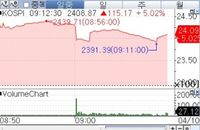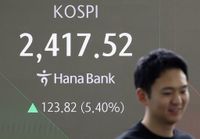On April 10, 2025, the South Korean stock market experienced a significant surge, fueled by U.S. President Donald Trump's unexpected decision to suspend reciprocal tariffs on allied countries, excluding China. The KOSPI index opened the day with a remarkable rise of over 5%, reflecting heightened investor confidence and a shift in market sentiment.
As of 9:12 AM, the KOSPI was trading at 2,408.87, up 115.17 points (5.02%) from the previous trading day. This upward momentum was initially sparked by Trump's announcement, which allowed the market to open with a 4.42% jump. The excitement in the market was palpable, as the KOSPI briefly touched 2,420 after opening. At 9:06 AM, the KOSPI 200 futures index rose nearly 6%, triggering a 'buying sidecar' that temporarily suspended program buying orders in response to the rapid price increase.
Foreign investors and institutions showed strong buying interest, net purchasing 67.3 billion won and 17.6 billion won, respectively, while individual investors were net sellers of 80.9 billion won. This marked a significant return of risk appetite among foreign investors, who had previously been cautious due to tariff concerns.
The KOSDAQ index also followed suit, trading at 671.00, up 27.61 points (4.29%) from the previous day. Most of the top market capitalization stocks saw gains, with notable performances from Samsung Electronics, which rose by 5.47%, and SK Hynix, which surged by an impressive 12.48%. Other major players such as Hyundai Motor and Kia also enjoyed gains of 7.3% and 5.25%, respectively.
Trump's announcement to suspend reciprocal tariffs for 90 days is seen as a strategic move to negotiate appropriate tariffs on a country-by-country basis, while maintaining a basic tariff of 10%. This decision alleviated fears of a full-blown trade war and provided much-needed relief to sectors heavily impacted by tariffs, particularly semiconductors.
Lee Sang-heon, a researcher at Kiwoom Securities, predicted that the domestic stock market would see a surge, particularly in tariff-affected sectors such as semiconductors, due to the positive market response in the U.S. following Trump's announcement. He noted that the KOSPI's price-to-book ratio (PBR) had fallen to 0.79 times, indicating that there was still room for value investment in the market.
In the pre-market trading on Nextrade (NXT), an alternative trading system, the market closed up 6.08% from the previous day, with a total of 36,724,744 shares traded. Among the 788 stocks traded, SK Hynix, Samsung Electronics, Hanwha Ocean, and Hyundai Motor were among the most actively traded.
Overall, the stock market's response to the tariff suspension reflects a broader sentiment of optimism, with investors hoping for a stabilization of global supply chains and a reduction in trade tensions. The Dow Jones Industrial Average closed up 2,962.86 points (7.87%) at 40,608.45, while the S&P 500 index surged 474.13 points (9.52%) to 5,456.90, and the Nasdaq Composite Index jumped 1,857.06 points (12.16%) to 17,124.97, all influenced by Trump's tariff suspension announcement.
In addition to the stock market's surge, the won-dollar exchange rate also showed signs of stabilization. The exchange rate fell by 14.5 won (0.99%) to 1,457.5 won per dollar as of the latest trading session, further contributing to the positive market sentiment.
Despite the optimistic outlook, analysts caution that the tariff war is not over and that risks remain in the market. However, the perception that tariffs are a negotiation tool and that actual tariff levels may not be as high as feared has provided some reassurance to investors.
In summary, the KOSPI's impressive rise on April 10, 2025, can be attributed to Trump's tariff suspension announcement, which has helped restore investor confidence and stimulate buying activity across major sectors, particularly technology and semiconductors. As the market continues to react to these developments, all eyes will be on how trade negotiations evolve in the coming weeks.

![[종합] 코스피, 8개월 만 '매수 사이드카' 발동…SK하이닉스 13% 급등 : 네이트 뉴스](https://thumbor.evrimagaci.org/AM-D0rMdBhcELBbqYRieFHW7Qp0=/200x0/tpg%2Fsources%2Fddbf38a6-1c32-48bb-befe-0c20e3c31118.jpeg)

![트럼프 관세 유예에 코스피 5% 상승 출발…환율은 38원↓[개장시황]](https://thumbor.evrimagaci.org/W_TVlQ40OVomISTDqX0d2TawzTg=/200x0/tpg%2Fsources%2F4fae4868-0b4c-4605-9887-645c023e6aea.jpeg)



